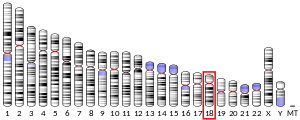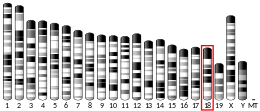MAPRE2
Appearance
(Redirected from MAPRE2 (gene))
Microtubule-associated protein RP/EB family member 2 is a protein that in humans is encoded by the MAPRE2 gene.[5][6][7]
Function
[edit]The protein encoded by this gene shares significant homology to the adenomatous polyposis coli (APC) protein-binding EB1 gene family. The function of this protein is unknown; however, its homology suggests involvement in tumorigenesis of colorectal cancers and proliferative control of normal cells. This gene may belong to the intermediate/early gene family, involved in the signal transduction cascade downstream of the TCR.[7]
Interactions
[edit]MAPRE2 has been shown to interact with APC.[8][9]
References
[edit]- ^ a b c GRCh38: Ensembl release 89: ENSG00000166974 – Ensembl, May 2017
- ^ a b c GRCm38: Ensembl release 89: ENSMUSG00000024277 – Ensembl, May 2017
- ^ "Human PubMed Reference:". National Center for Biotechnology Information, U.S. National Library of Medicine.
- ^ "Mouse PubMed Reference:". National Center for Biotechnology Information, U.S. National Library of Medicine.
- ^ Renner C, Pfitzenmeier JP, Gerlach K, Held G, Ohnesorge S, Sahin U, Bauer S, Pfreundschuh M (Aug 1997). "RP1, a new member of the adenomatous polyposis coli-binding EB1-like gene family, is differentially expressed in activated T cells". J Immunol. 159 (3): 1276–83. doi:10.4049/jimmunol.159.3.1276. PMID 9233623. S2CID 23797920.
- ^ Tirnauer JS, Canman JC, Salmon ED, Mitchison TJ (Dec 2002). "EB1 targets to kinetochores with attached, polymerizing microtubules". Mol Biol Cell. 13 (12): 4308–16. doi:10.1091/mbc.E02-04-0236. PMC 138635. PMID 12475954.
- ^ a b "Entrez Gene: MAPRE2 microtubule-associated protein, RP/EB family, member 2".
- ^ Su LK, Burrell M, Hill DE, Gyuris J, Brent R, Wiltshire R, Trent J, Vogelstein B, Kinzler KW (Jul 1995). "APC binds to the novel protein EB1". Cancer Res. 55 (14): 2972–7. PMID 7606712.
- ^ Nakamura M, Zhou XZ, Lu KP (Jul 2001). "Critical role for the EB1 and APC interaction in the regulation of microtubule polymerization". Curr. Biol. 11 (13): 1062–7. Bibcode:2001CBio...11.1062N. doi:10.1016/S0960-9822(01)00297-4. PMID 11470413. S2CID 14122895.
Further reading
[edit]- Tirnauer JS, Bierer BE (2000). "EB1 proteins regulate microtubule dynamics, cell polarity, and chromosome stability". J. Cell Biol. 149 (4): 761–6. doi:10.1083/jcb.149.4.761. PMC 2174556. PMID 10811817.
- Su LK, Burrell M, Hill DE, Gyuris J, Brent R, Wiltshire R, Trent J, Vogelstein B, Kinzler KW (1995). "APC binds to the novel protein EB1". Cancer Res. 55 (14): 2972–7. PMID 7606712.
- Berrueta L, Kraeft SK, Tirnauer JS, Schuyler SC, Chen LB, Hill DE, Pellman D, Bierer BE (1998). "The adenomatous polyposis coli-binding protein EB1 is associated with cytoplasmic and spindle microtubules". Proc. Natl. Acad. Sci. U.S.A. 95 (18): 10596–601. Bibcode:1998PNAS...9510596B. doi:10.1073/pnas.95.18.10596. PMC 27940. PMID 9724749.
- Morrison EE, Wardleworth BN, Askham JM, Markham AF, Meredith DM (1999). "EB1, a protein which interacts with the APC tumour suppressor, is associated with the microtubule cytoskeleton throughout the cell cycle". Oncogene. 17 (26): 3471–7. doi:10.1038/sj.onc.1202247. PMID 10030671. S2CID 25818701.
- Juwana JP, Henderikx P, Mischo A, Wadle A, Fadle N, Gerlach K, Arends JW, Hoogenboom H, Pfreundschuh M, Renner C (1999). "EB/RP gene family encodes tubulin binding proteins". Int. J. Cancer. 81 (2): 275–84. doi:10.1002/(SICI)1097-0215(19990412)81:2<275::AID-IJC18>3.0.CO;2-Z. PMID 10188731. S2CID 33232892.
- Hartley JL, Temple GF, Brasch MA (2001). "DNA cloning using in vitro site-specific recombination". Genome Res. 10 (11): 1788–95. doi:10.1101/gr.143000. PMC 310948. PMID 11076863.
- Nakamura M, Zhou XZ, Lu KP (2001). "Critical role for the EB1 and APC interaction in the regulation of microtubule polymerization". Curr. Biol. 11 (13): 1062–7. Bibcode:2001CBio...11.1062N. doi:10.1016/S0960-9822(01)00297-4. PMID 11470413. S2CID 14122895.
- Askham JM, Vaughan KT, Goodson HV, Morrison EE (2003). "Evidence that an interaction between EB1 and p150(Glued) is required for the formation and maintenance of a radial microtubule array anchored at the centrosome". Mol. Biol. Cell. 13 (10): 3627–45. doi:10.1091/mbc.E02-01-0061. PMC 129971. PMID 12388762.
- Bu W, Su LK (2004). "Characterization of functional domains of human EB1 family proteins". J. Biol. Chem. 278 (50): 49721–31. doi:10.1074/jbc.M306194200. PMID 14514668.
- Wiemann S, Arlt D, Huber W, Wellenreuther R, Schleeger S, Mehrle A, Bechtel S, Sauermann M, Korf U, Pepperkok R, Sültmann H, Poustka A (2004). "From ORFeome to biology: a functional genomics pipeline". Genome Res. 14 (10B): 2136–44. doi:10.1101/gr.2576704. PMC 528930. PMID 15489336.
- Rush J, Moritz A, Lee KA, Guo A, Goss VL, Spek EJ, Zhang H, Zha XM, Polakiewicz RD, Comb MJ (2005). "Immunoaffinity profiling of tyrosine phosphorylation in cancer cells". Nat. Biotechnol. 23 (1): 94–101. doi:10.1038/nbt1046. PMID 15592455. S2CID 7200157.
- Mimori-Kiyosue Y, Grigoriev I, Lansbergen G, Sasaki H, Matsui C, Severin F, Galjart N, Grosveld F, Vorobjev I, Tsukita S, Akhmanova A (2005). "CLASP1 and CLASP2 bind to EB1 and regulate microtubule plus-end dynamics at the cell cortex". J. Cell Biol. 168 (1): 141–53. doi:10.1083/jcb.200405094. PMC 2171674. PMID 15631994.
- Xu H, Hebert MD (2006). "A novel EB-1/AIDA-1 isoform, AIDA-1c, interacts with the Cajal body protein coilin". BMC Cell Biol. 6 (1): 23. doi:10.1186/1471-2121-6-23. PMC 1097723. PMID 15862129.
- Wang Y, Zhou X, Zhu H, Liu S, Zhou C, Zhang G, Xue L, Lu N, Quan L, Bai J, Zhan Q, Xu N (2005). "Overexpression of EB1 in human esophageal squamous cell carcinoma (ESCC) may promote cellular growth by activating beta-catenin/TCF pathway". Oncogene. 24 (44): 6637–45. doi:10.1038/sj.onc.1208819. PMID 16007168. S2CID 36511735.






